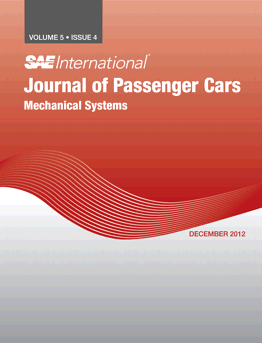
SAE International Journal of Passenger Cars-Mechanical Systems
Scope & Guideline
Exploring the Future of Passenger Car Dynamics
Introduction
Aims and Scopes
- Automotive System Dynamics:
Research exploring the dynamics of various automotive systems, including driveline optimization and braking dynamics, focusing on improving vehicle performance and safety. - Thermal and Environmental Impact Studies:
Investigations into how environmental conditions affect vehicle components, such as electrical connectors and thermal management systems, emphasizing the importance of adaptability in automotive design. - Innovative Material and Design Analysis:
Studies on new materials and designs, such as non-pneumatic tires and electromagnetic dampers, aiming to enhance vehicle durability and performance through innovative engineering solutions. - Control Systems and Simulation:
Development and application of advanced control systems for automotive components, including predictive control algorithms for optimal performance, highlighting the importance of simulation in automotive engineering. - Aerodynamics and Noise Reduction:
Research focused on reducing aerodynamic drag and wind noise in vehicles, which is critical for enhancing fuel efficiency and passenger comfort.
Trending and Emerging
- Advanced Computational Techniques in Design:
There is an increasing focus on using computational methods, such as genetic algorithms and particle swarm optimization, for the design and analysis of automotive components, showcasing the intersection of engineering and computer science. - Sustainability and Environmental Considerations:
Research addressing the environmental impacts of automotive technologies, including studies on particulate filters and energy-efficient systems, is gaining traction as the industry prioritizes sustainability. - Integration of Smart Technologies:
Emerging themes related to smart control systems and diagnostics, such as model predictive control and pressure sensing diagnostics, reflect the industry's shift towards smarter, more automated vehicle systems. - Aerodynamic Optimization Techniques:
There is a notable trend in research focusing on aerodynamic improvements, including drag reduction strategies and wind noise mitigation, highlighting the industry's commitment to enhancing fuel efficiency and passenger experience.
Declining or Waning
- Traditional Mechanical Systems Analysis:
Research focusing solely on conventional mechanical systems without integrating modern computational techniques or materials has decreased, as the industry moves towards more innovative and integrated approaches. - Basic Component Testing:
Studies that mainly involve standard testing of automotive components without addressing system-level interactions or advanced modeling techniques are less frequently published, indicating a shift towards more complex analyses.
Similar Journals
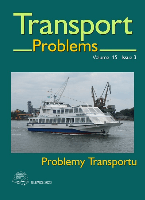
Transport Problems
Pioneering Research for Global Transport ChallengesTransport Problems, published by the Silesian University of Technology, Faculty of Transport, is a distinguished open-access journal that has been advancing scholarship in the fields of Automotive Engineering, Mechanical Engineering, and Transportation since its inception in 2007. With an ISSN of 1896-0596 and an E-ISSN of 2300-861X, this journal serves as a vital platform for researchers and practitioners to disseminate innovative research findings and explore fundamental issues in transport systems and technologies. Based in Poland, the journal covers various topics including transportation logistics, vehicle dynamics, and environmental impacts, thereby addressing critical challenges faced in the transportation sector globally. As reflected in its Scopus rankings, the journal occupies respectable quartiles and continues to contribute valuable insights to the academic community. By making its content freely accessible, Transport Problems significantly enhances the ability of researchers and students alike to engage with the latest developments in transport engineering and contribute to this ever-evolving field.
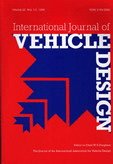
INTERNATIONAL JOURNAL OF VEHICLE DESIGN
Transforming Concepts into Cutting-Edge VehiclesThe INTERNATIONAL JOURNAL OF VEHICLE DESIGN is a distinguished publication that has been at the forefront of automotive engineering and mechanical design since its inception in 1979. Published by INDERSCIENCE ENTERPRISES LTD in the United Kingdom, this journal aims to foster innovative research and technical knowledge in the field of vehicle design, encompassing various aspects from conceptualization to manufacturing and performance analysis. With an ISSN of 0143-3369 and an E-ISSN of 1741-5314, the journal extends its accessibility to a global audience, although it currently does not operate under an open access model. Recognized for its scholarly contributions, it holds a Q3 ranking in Automotive Engineering and a Q4 ranking in Mechanical Engineering as of 2023, reflecting its position among peers with an increasing impact in the discipline. Researchers, professionals, and students will find valuable insights and cutting-edge research in the articles published, contributing to a deeper understanding of advancing vehicle technologies and methodologies. For inquiries, the journal is based at the World Trade Center Building, 29 Route de Pré-Bois, Case Postale 856, CH-1215 Geneva, Switzerland, where one can also follow its developments and contribution to the growing body of knowledge in vehicle design.

Composites-Mechanics Computations Applications
Transforming theoretical advancements into practical solutions.Composites-Mechanics Computations Applications is a pioneering journal published by BEGELL HOUSE INC, dedicated to advancing the field of composite materials and mechanics. With an ISSN of 2152-2057 and an E-ISSN of 2152-2073, this journal serves as a vital resource for researchers, professionals, and students seeking to explore the latest advancements in composite materials, computational mechanics, and their applications across various industries. Although it currently resides in the Q4 category for both ceramics and composites, as well as mechanics of materials, it provides a platform for quality research that highlights emerging trends and innovations. The journal, operational from 2010 to 2024, encourages submissions that cover theoretical, experimental, and computational methodologies, aiming to bridge the gap between practical applications and theoretical advancements. While the journal does not offer open access, it remains an important source for insightful studies that contribute to the evolving disciplines of materials science and engineering.

Vehicles
Transforming Ideas into Automotive AdvancementsVehicles is a pioneering open access journal published by MDPI since 2019, dedicated to advancing knowledge in the fields of Automotive Engineering and Electrical and Electronic Engineering. Based in Switzerland, the journal provides a valuable platform for researchers, professionals, and students to disseminate high-quality, peer-reviewed research across essential areas of vehicle technology and innovation. With an impressive Q2 ranking in both Automotive Engineering and Electrical and Electronic Engineering as of 2023, and a notable placement in the Scopus rankings (Rank #37/125 and #320/797, respectively), Vehicles plays a critical role in fostering collaboration and knowledge exchange within these fast-evolving disciplines. Through its commitment to Open Access, Vehicles ensures that cutting-edge research is accessible to a global audience, thereby contributing significantly to the collective understanding and development of sustainable transportation solutions. Situated at the crossroads of engineering innovation and practical application, Vehicles invites contributions that explore contemporary challenges and promote transformative advancements in the automotive sector.
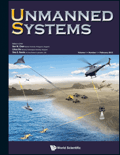
Unmanned Systems
Exploring Innovations in Unmanned Vehicle ResearchUnmanned Systems is a leading academic journal published by WORLD SCIENTIFIC PUBL CO PTE LTD based in Singapore, that serves as a premier platform for research and advancements in unmanned vehicle technology. Covering a broad range of disciplines, the journal ranks in the Q1 category for Aerospace Engineering, Automotive Engineering, Control and Optimization, and Control and Systems Engineering as of 2023, showcasing its high impact within these fields. With impressive Scopus rankings placing it in the top tiers of its categories—8th in Control and Optimization and 14th in Aerospace Engineering—Unmanned Systems stands out as a vital resource for researchers, professionals, and students eager to explore current trends and innovations. While the journal operates under a traditional access model, it remains committed to disseminating quality original research, reviews, and case studies that contribute significantly to the understanding and application of unmanned technologies from 2013 through 2024.
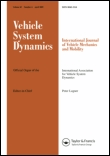
VEHICLE SYSTEM DYNAMICS
Exploring the future of safe and efficient vehicle design.VEHICLE SYSTEM DYNAMICS, published by Taylor & Francis Ltd, is a premier journal dedicated to advancing the field of automotive and mechanical engineering. With an impressive impact factor and categorized in the top quartiles (Q1) of Automotive Engineering, Mechanical Engineering, and Safety, Risk, Reliability, and Quality, this journal has established itself as a vital resource for researchers, industry professionals, and academics alike. Spanning from 1972 to 2024, VEHICLE SYSTEM DYNAMICS focuses on disseminating high-quality, peer-reviewed research that addresses critical challenges and innovations in vehicle dynamics and system performances. The journal is based in the United Kingdom and continues to contribute significantly to the global discourse on safe and efficient vehicle design and operation. Readers can access the journal's content through various platforms, ensuring the latest research is readily available to inform and inspire future advancements in the field.

Journal of Computational and Nonlinear Dynamics
Exploring Innovative Solutions in Nonlinear Engineering.Welcome to the Journal of Computational and Nonlinear Dynamics, a leading publication in the fields of applied mathematics, control and systems engineering, and mechanical engineering, published by the esteemed American Society of Mechanical Engineers (ASME). With an ISSN of 1555-1423 and an E-ISSN of 1555-1415, this journal has been a vital resource since its inception in 2006, promoting high-quality research and innovative methodologies aimed at solving complex engineering problems. With a commendable impact in academic circles, it ranks in the Q3 quartile for Applied Mathematics and Control and Systems Engineering, and Q2 for Mechanical Engineering as of 2023. The journal facilitates the dissemination of research findings, theoretical advancements, and practical applications, making it an essential platform for researchers, professionals, and students looking to advance their knowledge and engage with cutting-edge dynamics research. While currently not available as an open-access publication, subscribers benefit from a wealth of scholarly articles that contribute to the academic community's understanding of computational and nonlinear dynamics in various engineering disciplines.
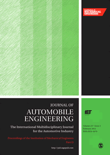
PROCEEDINGS OF THE INSTITUTION OF MECHANICAL ENGINEERS PART D-JOURNAL OF AUTOMOBILE ENGINEERING
Fostering Excellence in Automotive Research and DevelopmentPROCEEDINGS OF THE INSTITUTION OF MECHANICAL ENGINEERS PART D-JOURNAL OF AUTOMOBILE ENGINEERING, published by SAGE PUBLICATIONS LTD, is a premier peer-reviewed journal dedicated to advancing the field of automobile engineering. Established in 1989, this journal serves as a vital platform for researchers, professionals, and students interested in the latest advancements in automotive technology and engineering practices. With a significant focus on aerodynamics, vehicle dynamics, and safety innovations, it consistently ranks in the Q2 quartile within both Aerospace Engineering and Mechanical Engineering, showcasing its influence and reliability in the academic community. The journal is indexed in Scopus with impressive rankings, being placed in the 41st percentile for Aerospace Engineering and the 214th percentile for Mechanical Engineering, further solidifying its importance in these fields. As an important resource for cutting-edge research, the journal does not currently offer open access, making it a great venue for disseminating substantial findings that drive the future of automotive innovation.
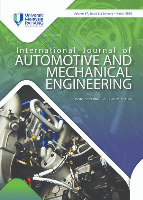
International Journal of Automotive And Mechanical Engineering
Shaping Tomorrow's Engineering Solutions TodayThe International Journal of Automotive and Mechanical Engineering (IJAME), published by Universiti Malaysia Pahang, serves as a premier platform for the dissemination of cutting-edge research in the fields of Automotive and Mechanical Engineering. Established in 2010, this Open Access journal not only ensures that high-quality research is freely accessible to the global community but also reflects its commitment to advancing knowledge in these crucial engineering domains. With an impressive standing in the 2023 Scopus Ranks, achieving a Q3 ranking in both Automotive Engineering and Mechanical Engineering, IJAME proudly showcases a diverse range of articles that address contemporary challenges and innovations. Positioned in Malaysia and aimed at researchers, professionals, and students alike, this journal invites contributions that explore the intersection of theory and practice within automotive technologies and mechanical design. Join a growing international community that is shaping the future of engineering through open collaboration and knowledge sharing.
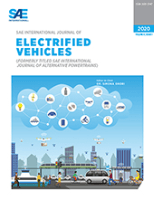
SAE International Journal of Electrified Vehicles
Catalyzing Advances in the Electrified Vehicle SectorSAE International Journal of Electrified Vehicles, published by SAE International, is a pioneering journal dedicated to the field of electrified transportation. Operating since 2020, this journal offers a crucial platform for researchers, engineers, and practitioners who are at the forefront of advancements in vehicle electrification and related technologies. With an ISSN of 2691-3747 and an E-ISSN of 2691-3755, it is indexed within respected databases, showcasing its commitment to high-quality research in Automotive Engineering and Fuel Technology. As part of the Q3 category in the 2023 rankings for both automotive and energy sectors, the journal facilitates the exchange of innovative ideas and groundbreaking studies that contribute to the evolution of the electrified vehicle industry. While currently not open access, the journal offers various subscription options for readers, making valuable insights accessible to a broad audience. Conducting research in this dynamic field, the SAE International Journal of Electrified Vehicles is vital for professionals striving to push the boundaries of technology and sustainability in modern transportation.